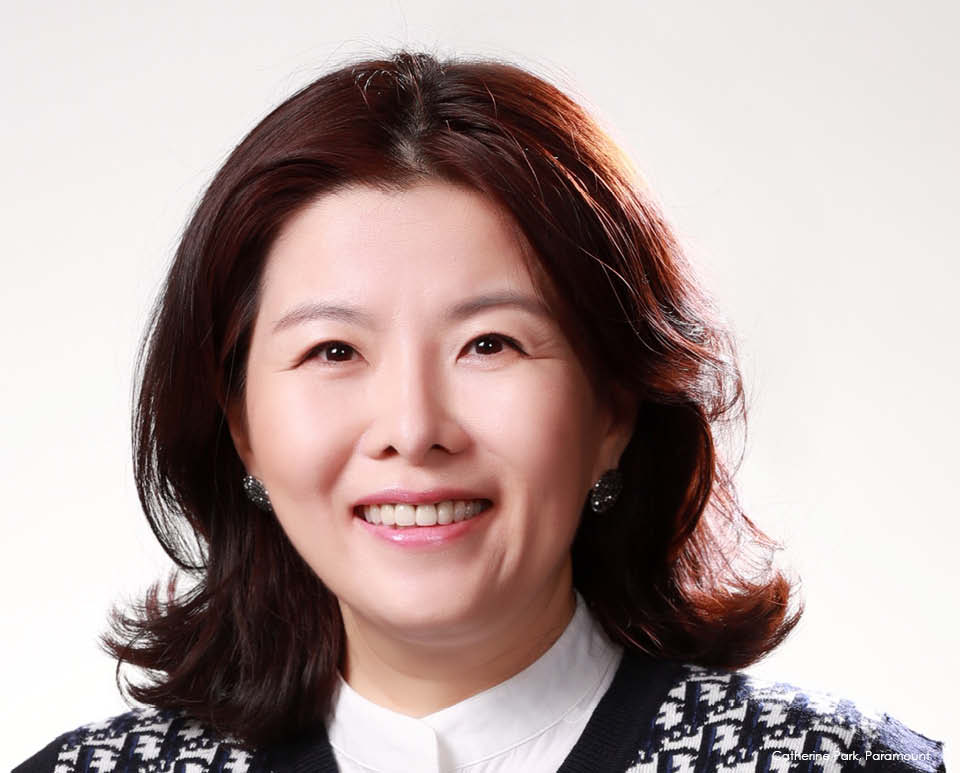
Paramount+ rolled out in Korea in June 2022 in partnership with CJ ENM-led domestic platform TVing, kicking off a new era in Asia for the U.S.-based global streamer. Catherine Park, Paramount’s SVP, Head of Office and Streaming for Asia, talks about go-to-market strategies.
Global SVOD streamer Paramount+ rolled out in Korea in June this year in partnership with domestic platform TVing, kicking off a new era in Asia for the U.S.-based streamer. Other markets in Asia will follow, as has Korean sci-fi original, "Yonder", the first co-production with Korea’s CJ ENM/TVing that is part of a global partnership announced at the end of 2021.
Priorities in Korea, says Catherine Park, Paramount SVP, head of office & streaming for Asia, are not different from other regions – a market-by-market focus on content that resonates with different demographics. No dates have been announced for Paramount+’s roll out in Asia outside of Korea.
Paramount+’s approach is “something for everyone”, delivered via Paramount’s own brands as well as multiple content collaborations and a focus on local content in every market, Park says.
Futuristic drama "Yonder", which premieres on TVing in Korea on 14 October after its debut at this year’s Busan International Film Festival, adds to a growing body of Korean TV series that go beyond the mass of romantic drama/romcoms. Park says "Yonder" – although perhaps more of a risk – was interesting for this very reason.
Directed by filmmaker Lee Joon-ik in his first TV project, the six-episode series is the story of a man (played by Shin Ha-kyun) who receives a message from his dead wife (Han Ji-mi), who recorded her memories before she passed and invites him to join her in the afterlife. The TV series, set in the near future, is based on Korean writer Kim Jang-hwan’s novel, "Good-Bye Yonder".
“Yonder was a very interesting project to us because normally, when people talk about Korean drama... it’s mostly romance or romantic comedy, or family drama... we are not really known for sci-fi although we are trying,” she says. At its heart, Lee Joon-ik’s series is about happin...
Paramount+ rolled out in Korea in June 2022 in partnership with CJ ENM-led domestic platform TVing, kicking off a new era in Asia for the U.S.-based global streamer. Catherine Park, Paramount’s SVP, Head of Office and Streaming for Asia, talks about go-to-market strategies.
Global SVOD streamer Paramount+ rolled out in Korea in June this year in partnership with domestic platform TVing, kicking off a new era in Asia for the U.S.-based streamer. Other markets in Asia will follow, as has Korean sci-fi original, "Yonder", the first co-production with Korea’s CJ ENM/TVing that is part of a global partnership announced at the end of 2021.
Priorities in Korea, says Catherine Park, Paramount SVP, head of office & streaming for Asia, are not different from other regions – a market-by-market focus on content that resonates with different demographics. No dates have been announced for Paramount+’s roll out in Asia outside of Korea.
Paramount+’s approach is “something for everyone”, delivered via Paramount’s own brands as well as multiple content collaborations and a focus on local content in every market, Park says.
Futuristic drama "Yonder", which premieres on TVing in Korea on 14 October after its debut at this year’s Busan International Film Festival, adds to a growing body of Korean TV series that go beyond the mass of romantic drama/romcoms. Park says "Yonder" – although perhaps more of a risk – was interesting for this very reason.
Directed by filmmaker Lee Joon-ik in his first TV project, the six-episode series is the story of a man (played by Shin Ha-kyun) who receives a message from his dead wife (Han Ji-mi), who recorded her memories before she passed and invites him to join her in the afterlife. The TV series, set in the near future, is based on Korean writer Kim Jang-hwan’s novel, "Good-Bye Yonder".
“Yonder was a very interesting project to us because normally, when people talk about Korean drama... it’s mostly romance or romantic comedy, or family drama... we are not really known for sci-fi although we are trying,” she says. At its heart, Lee Joon-ik’s series is about happiness, no matter how long you live. “It’s a very universal story... we think it is something we can market internationally”.
Other content trends in Korea are the focus on developing TV series from existing IP, particularly webtoons, which adds to the country’s long-held tradition of prioritising writers and their original stories; developing Asian franchises, with all the multi-platform facets this involves; and building out universes that can be continuously exploited.
The alliance with TVing is something of a blueprint for Paramount+’s roll out in Asia.
“The important part of the go-to-market strategy is having a partner where we can access local talent and/or local content,” she adds, highlighting the benefits of bringing more relevant content to markets in Asia and the potential to take local content and co-productions to international markets.
Although it’s early days, Paramount+ will be on the market in Asia for third-party local content rights, not least because originals take time to develop. That’s not, right now, the primary focus of local rights holders’ attention, although no one is turning away from a potential new buyer. A more common question is: Is Paramount+ too late to Asia’s streaming game?
No, of course not, Park says, highlighting Paramount’s content depth and breadth through, among others, Viacom International Studios (VIS) and CBS International Studios, and its experience with FAST (free advertising-supported TV) service, Pluto. The ability to offer a whole lot in one place is a strength that will grow as markets fragment. While multiple smaller services may be worthwhile, “at the same time, economically, I think for consumers, they want just the ease, just one stop”.
And then there’s this, the product of early and ardent efforts by players who have paved the way for SVOD: subscriptions. “People are getting used to paying for content”, despite still rampant piracy in some markets, and they have become familiar with the convenience of on-demand entertainment, Park says. “Once you are used to this, it’s hard to go back”.
By providing various touch points for content, including linear channels, “we can be very competitive”. Add local partners and content, and the lure of being able to offer creators a path to international markets, “I think we are very competitive,” Park says.
Published in ContentAsia's October 2022 magazine for Mip Junior/Mipcom



















